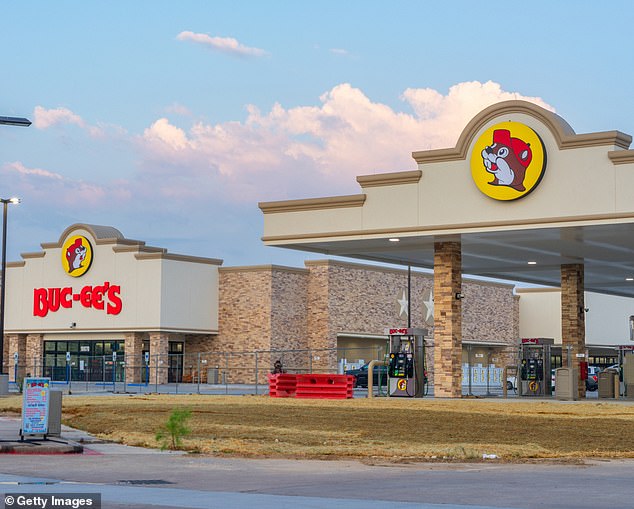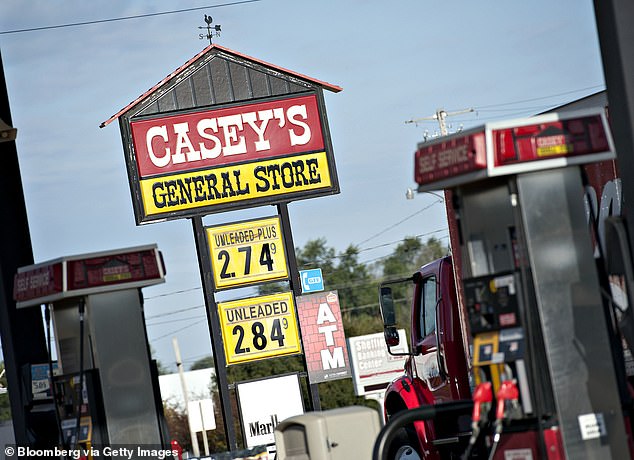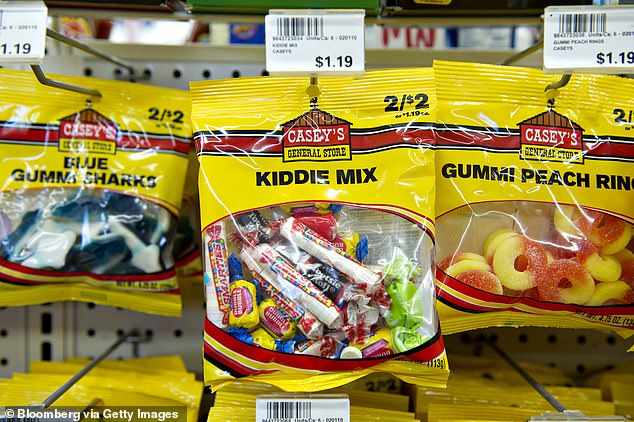Casey’s General Stores announces 198 new locations as it expands into three new states to challenge Buc-ee’s
Nearly 200 new Casey’s General Stores are opening in three Southern states after the company acquired Fikes Wholesale, the owner of CEFCO supermarkets.
The $1.15 billion deal was an all-cash transaction and is an effort to boost Casey’s presence in Texas.
The Fikes acquisition will allow Casey’s to open 148 stores in the Lone Star State, a market the company entered in November after acquiring W. Douglass Distributing and its 22 Lone Star Food Stores.
This will see the company surpass Buc-ee’s in the Midwest as the most visible stop in the region.
By comparison, Buc-ee’s has 50 locations in the South, including Alabama, Florida and Texas, where it has 35. Most of the stores are in small towns within the triangle between Dallas, Houston and San Antonio.
Nearly 200 new Casey’s General Stores will open in Alabama, Florida and Mississippi after the company acquires Fikes Wholesale, the owner of CEFCO convenience stores

It will see Midwest company overtake Buc-ee’s as the area’s most visible road stop. By comparison, Buc-ee’s has just 35 locations in Texas
Casey’s shares have risen about 35 percent so far this year, including 5 percent when the deal was announced on Friday.
Casey’s, the third-largest supermarket chain in the United States, is expanding its presence in the country to nearly 2,900 stores with the acquisition of owner CEFCO.
In addition to the 148 CEFCO stores in Texas, there are another 50 in Alabama, Florida and Mississippi, and a dealer network.
The “solid add-on transaction” will expand Casey’s network by approximately 7 percent across the four states.
“This acquisition will quickly expand Casey’s presence in Texas, a very attractive market for Casey’s,” said Casey’s CEO Darren Rebelez. “It also allows us to expand our footprint further south.”
The deal is not expected to face any major regulatory hurdles as the company currently has a limited presence in those states.
Casey’s plans to finance the transaction through cash on hand and bank financing, and expects the deal to close in the fourth quarter of this year.

Midwest company Casey’s will overtake Buc-ee’s as most visible stop in region

The chain sells its own brand products, including chips, dried beef, toilet paper, tissues, batteries, cleaning products and sweets
The Iowa-based company, also known for the pizza in its stores, expects annual sales growth of about $45 million after kitchen installations are completed in the newly acquired stores.
“The acquisition by Casey’s is an exciting development for Fikes and our employees, especially given the company’s reputation and shared values,” said Raymond Smith, president of Fikes and CEFCO.
“I am pleased that the CEFCO stores will be affiliated with a leading convenience store that will reinvest in the stores and ultimately bring Casey’s pizza to many of our customers while also providing professional opportunities for our employees.”
Casey’s plans to remodel the CEFCO kitchens to supply the locations with food.
Casey’s specializes in whole pizzas, including breakfast pizzas.
The chain also sells its own brand products, including chips, dried beef, toilet paper, tissues, batteries and cleaning products.

The total number of closures in 2023 was 5,463, an increase of 30 percent compared to the 2022 figures
The expansion takes place at a time when a large number of stores have closed nationwide.
U.S. retailers are set to close nearly 5,500 stores by 2023, with major companies like Bed Bath & Beyond, Walgreens and Rite Aid leading the way.
The closures affected a wide range of sectors, from clothing stores to discount retailers and drugstores, as U.S. commerce increasingly moves online.
But the residential and office sector was hit the hardest, accounting for more than 30 percent of all closures, more than twice as many as in 2022.
The high numbers came as many retailers, such as Bed Bath & Beyond and Tuesday Morning, filed for bankruptcy in 2023 and closed nearly all of their stores as a result.

The closures affected a range of sectors, from clothing stores to discount stores and drugstores
Other retailers, such as Signet Jewelers, announced closures due to generally poor sales.
Many retailers, such as Walgreens, have cited rising theft as a reason for their declining profits and their decision to close their locations.
According to the latest estimates from consultancy Coresight Research, there were 5,463 closures in total, up 30 percent from 2022.
Bed Bath & Beyond said it would close 866 stores, far more than any other retailer, the report said.
The high number is because the company filed for bankruptcy in April and liquidated all its branches within a few months.
The closures accounted for about half of the total number of closures in the residential and office sectors.
Walgreens is in second place, closing 505 stores, bringing the total number of stores to 8,880.
